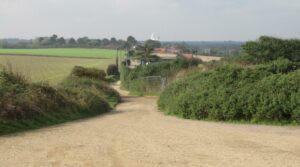Support us from £3/month
We deal with almost 1000 cases a year assisting communities, groups and individuals in protecting their local spaces and paths in all parts of England and Wales. Can you help us by joining as a member?
We are dismayed that the environment secretary, Thérèse Coffey, has destroyed the 2010 consensus for the future of public paths.
This consensus was forged by a stakeholder working group (SWG) set up to advise government. It is composed of experienced members reflecting the interests of users, local authorities, and landowners. Dr Coffey has cherry-picked from the group’s report, Stepping Forward, abandoning recommendations opposed by landowners.

Restricted byway at Paston, Norfolk, saved from the guillotine by local correspondent Ian Witham, whose claim was confirmed in 2021. Photo: Open Spaces Society
Today—on her instruction—the government will take the irreversible step of imposing a guillotine on recording historic ways for the definitive map (the official record of public highways). This will extinguish people’s rights on unrecorded historic paths on 1 January 2026, now to be set back to 2031. As Dr Coffey knows, the SWG agreed that there should be regulations listing the circumstances in which those rights would be excepted from extinguishment—for example, paths in use, those in urban areas, and those subject to applications to record the paths.
But Dr Coffey has decided, at five-days’ notice (given to the SWG via her civil servants), to impose the guillotine from today with the exceptions to follow at an unspecified future date. And without consultation, she has ruled that the exception for unrecorded historic paths in use will not be introduced at all. (This was a core proposal (26) of Stepping Forward.)
The effect will be that users must work desperately hard to claim the thousands of unrecorded routes in use before the deadline—thus overwhelming the local authorities which must process these applications. It is inevitable that many will be missed, and that, in the years after 2031, the public unexpectedly will be barred from ways that have been in use sometimes for centuries.
Complex legislation
Says Kate Ashbrook, our general secretary and a member of the SWG since its inception in 2008: ‘The group has been working for 15 years to implement this complex legislation. Stepping Forward was a balanced package, to which all had to make compromises—but now the environment secretary has kicked us in the teeth by picking proposals which favour landowners.
‘SWG aimed to speed up and streamline the updating of definitive maps, and to save paths which ought not to be extinguished. Without grasping the complexity or importance of the detail, Ms Coffey has smashed our consensus.
‘We shall campaign to get a proper, fair procedure put in place to save routes which are being used. Indeed, we trust that a future government will repeal the 2031 deadline.
‘Public access has never been more vital, and our path network is the most popular means of gaining that access. This rash and prejudicial move by government will lead to the loss of thousands of public paths,’ says Kate.
